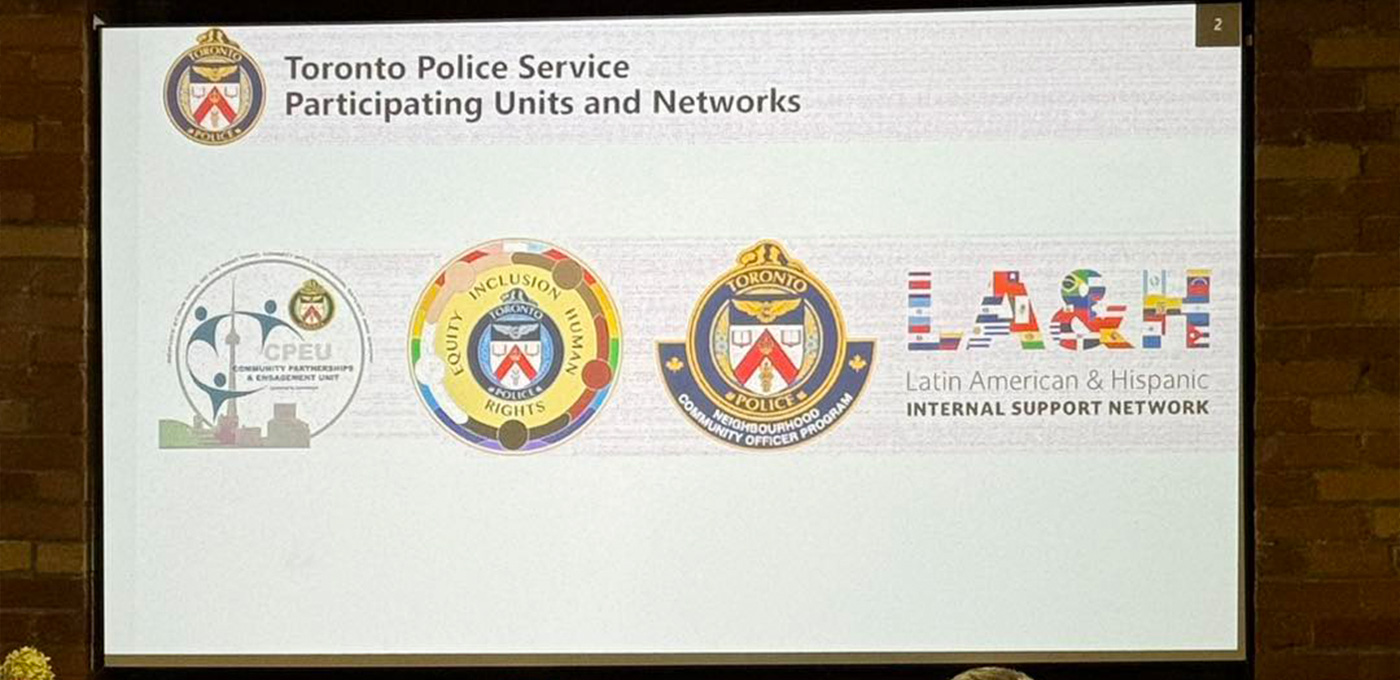
A Long-Awaited Dialogue: Police Meet with the Community
category:
Culture
date:
September 29, 2024
Author:
Laura Silva
“My home is your home,”
Said journalist and Hispanic Canadian Heritage Council (HCHC) director Oscar Vigil, as he welcomed members of the Toronto Police Service (TPS) to an important meeting marking the beginning of a new stage of joint work.
Last Thursday, September 19, became a milestone for Toronto’s Latin community under the title “TPS: Issues and Concerns of the Hispanic/Latin American Community.” The event brought together TPS representatives and local Latin leaders for a historic conversation.
It was a long-awaited moment — the last time a similar gathering took place was back in the 1990s, as Oscar Vigil recalled. This time, the purpose was clear: to open a sincere and transparent dialogue to strengthen ties between the police and a growing community eager to be heard.
From the very beginning, the atmosphere was warm. Attendees, who gathered around 6:00 p.m., were greeted with tacos and drinks — setting the stage for an evening that promised to be both engaging and revealing.
As night fell, the conversation began under the moderation of Jenniffer Quintero, Project Lead at the TPS. With an empathetic yet firm tone, she invited everyone to speak freely and reminded the group of the meeting’s main goal: for the police to listen to the community’s concerns while also sharing information about TPS programs, processes, and overall responsibilities.
Among those attending were key members from various TPS divisions, including the Race and Identity-Based Data Strategy Team, the Community Partnership and Engagement Unit, and the Equity, Inclusion and Human Rights Unit. The Neighbourhood Community Officer Program and the Latin American and Hispanic Internal Support Network were also represented.
A crucial topic discussed was the role of Neighbourhood Community Officers, a program introduced in 2013 that has evolved since. These officers are assigned to a specific neighbourhood for at least four years — time that allows them to build meaningful trust with residents. One officer noted that the hardest part is often getting young people to trust them, emphasizing that staying in one community long-term helps officers understand local dynamics and work closely with residents.
The Latin community, meanwhile, was represented by lawyers, community and social workers, academics, entrepreneurs, social leaders, and delegates from several consulates. Attendees voiced concerns about communication barriers and the mistrust that sometimes arises toward police officers — and the challenges that creates. To find solutions, police representatives stressed that they cannot create safety on their own; they need the community’s active collaboration. “The challenge is to build together a program that connects and empowers us,” one officer said.
Latin American and Hispanic Internal Support Network
The discussion didn’t stop there. Serious issues such as human trafficking, domestic violence, and the increasing presence of guns on city streets were also raised. Some participants voiced deep concern for Latin youth — and rightly so. Gangs have become a growing threat, and both the community and the police recognize the urgency of taking action.
Additionally, the lack of clear and accessible information about Canadian laws, rights, and responsibilities was identified as a gap that needs to be filled. Sharing this information in Spanish, involving young people, and using social media could make a real difference.
As a result, one of the most significant proposals of the evening was to develop educational campaigns targeting the Latin community. One attendee shared her experience working with the Chinese community, where such initiatives already exist through short videos, and suggested replicating that model for Latin audiences.
Still, the solution won’t be simple. Toronto’s Latin community is diverse, and what works for one group may not be relevant for another. As one community leader pointed out, “We must recognize that within our own community there are social, economic, and racial differences. It’s a challenge — but one we must face together.”
The meeting ended with heartfelt applause and a clear message: this is not the end, but the beginning of a path toward better integration between the Latin community and the TPS.
Viviana Santivañez, community leader and founder of Vivi’r LGBTQ+, closed the meeting with a powerful invitation:
“Remember that my home is your home. We’ve opened our doors — but more than words, we now need action.”
The gathering made it clear that both the Latin community and the TPS are committed to continuing this dialogue, working hand in hand for a safer, more inclusive, and more collaborative future.
If you’d like to be part of these ongoing conversations and work together with the police for the benefit of our Latin community, contact the HCHC — we invite you to join and help make a difference!
